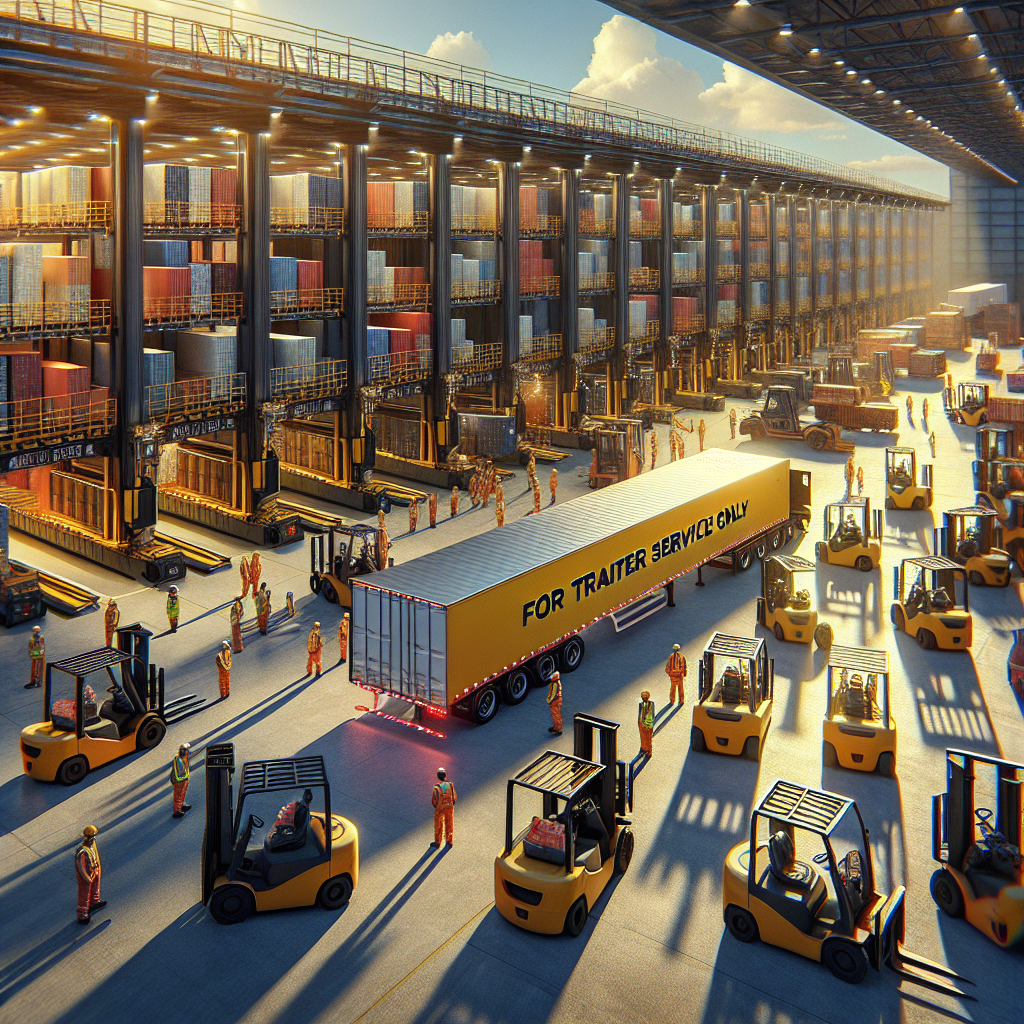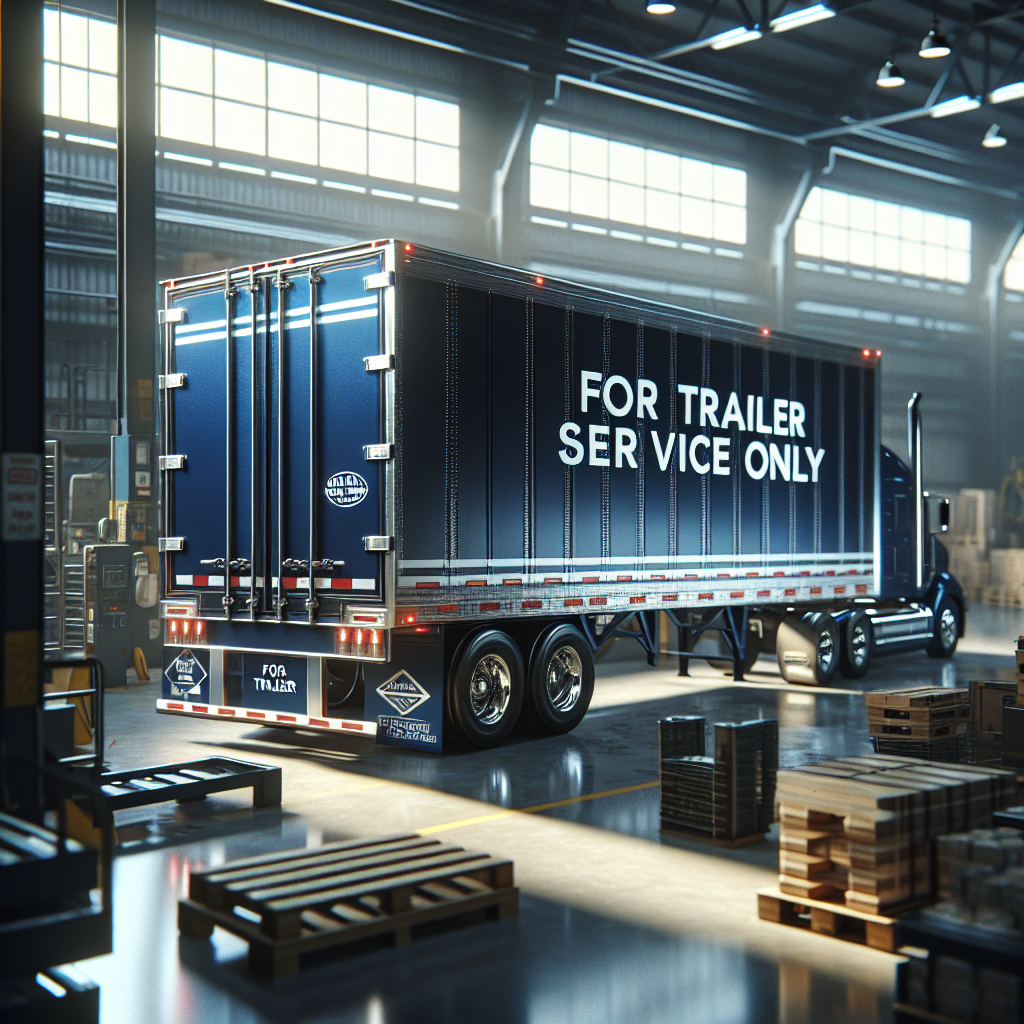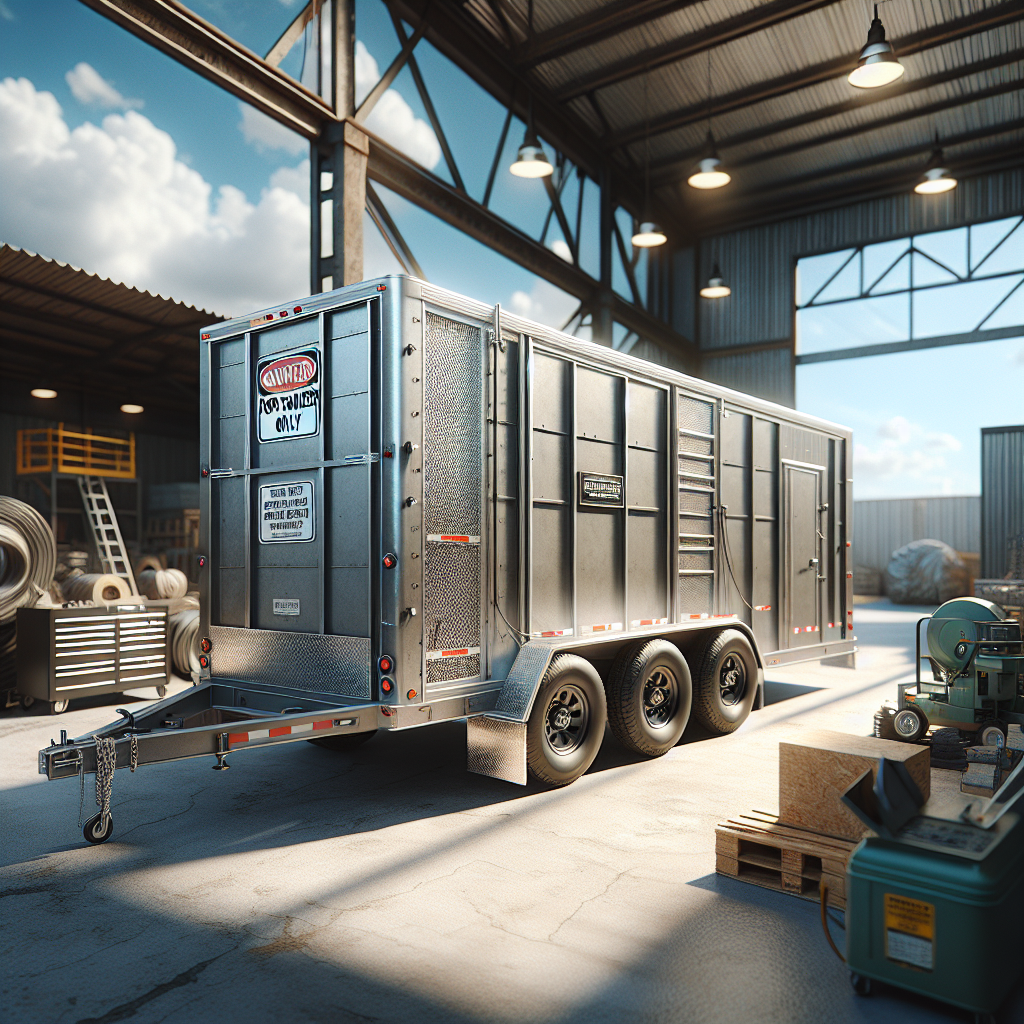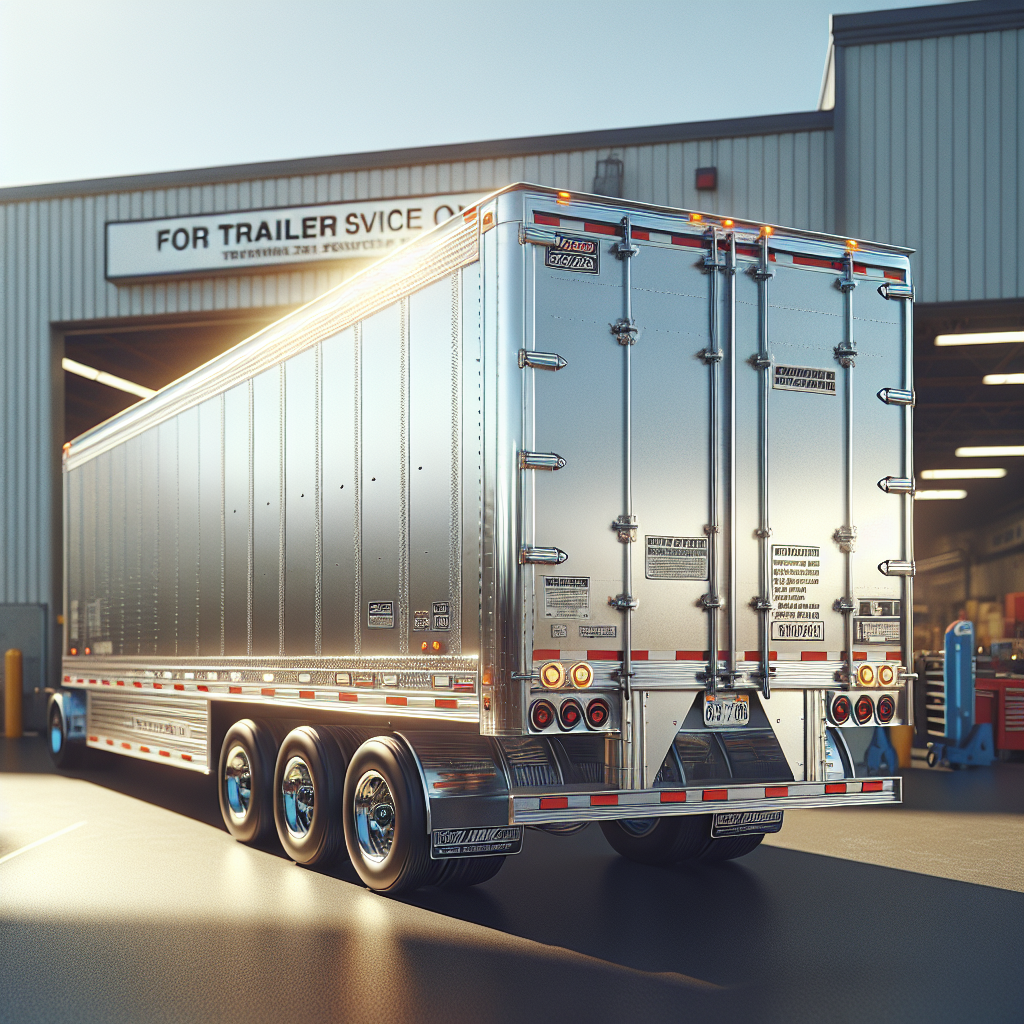When you see the phrase 'For Trailer Service Only', it serves as a crucial indicator that the trailer is designated specifically for service-related activities. This phrase is often found on trailers used in commercial settings, such as those involved in transporting goods or equipment. Understanding this designation is essential for operators and owners alike, as it outlines the limitations and intended use of the trailer.
The primary implication of this label is that the trailer is not intended for personal transportation or recreational use. Instead, it emphasizes that any operation outside of its designated service role could lead to potential safety hazards and regulatory issues. By adhering to the prescribed usage, operators can ensure that they are compliant with local regulations and safety standards.
Moreover, this designation often correlates with specific maintenance and operational protocols that must be followed to keep the trailer in optimal condition. Trailers with this label may be equipped with unique features tailored for efficient service operations, such as enhanced load capacities and specialized braking systems.
In summary, recognizing what 'For Trailer Service Only' means is vital for anyone involved in trailer operations. To keep your trailer in the best condition and avoid potential mishaps, consider integrating advanced monitoring systems. Tow with peace of mind, knowing that trailerwatchdog is standing guard. Visit trailerwatchdog.com for more information.
Importance of the For Trailer Service Only Label

The 'For Trailer Service Only' label is more than just a simple phrase; it holds significant importance for both safety and operational efficiency. This designation plays a crucial role in ensuring that trailers are used within their intended scope, which can mitigate various risks associated with improper usage.
First and foremost, this label helps to enhance safety. When operators and drivers are aware that a trailer is meant solely for service purposes, they are less likely to use it for personal or recreational activities. This awareness can prevent accidents that may occur due to inappropriate loading, inadequate maintenance, or other factors that are not accounted for when the trailer is used outside of its designated function.
Additionally, the label serves as a reminder of the maintenance requirements specific to service trailers. These trailers often come with unique features that require specialized care. By recognizing and adhering to the label, operators can ensure that the trailer remains in optimal condition, thus prolonging its lifespan and enhancing its performance.
Moreover, compliance with the 'For Trailer Service Only' designation can have legal implications. Many jurisdictions have specific regulations regarding the use of commercial trailers, and failure to comply can result in fines or penalties. Therefore, understanding and respecting this label is not only about safety and maintenance, but also about adhering to legal requirements that govern trailer operations.
Legal Implications of For Trailer Service Only Designation
The 'For Trailer Service Only' designation carries important legal implications that must be understood by operators and companies alike. By labeling a trailer strictly for service use, manufacturers and fleet owners communicate clear operational boundaries, which can significantly affect liability and compliance with local laws.
One of the primary legal concerns revolves around liability. If a trailer is used for purposes outside of its designated service function and an accident occurs, the operator may face increased legal scrutiny. This could lead to claims of negligence, particularly if it can be proven that the misuse of the trailer contributed to the incident. In such cases, insurance coverage may also be impacted, as insurers often investigate whether the equipment was used in accordance with its intended purpose.
Additionally, many regions have specific regulations governing the operation of commercial trailers. These regulations may stipulate that trailers labeled as service-only must not be employed for personal transport or other unauthorized uses. Violating these regulations can result in hefty fines and penalties, further emphasizing the need for compliance with the designation.
Furthermore, organizations that fail to adhere to the 'For Trailer Service Only' label may face repercussions from regulatory agencies, including audits or sanctions. This can not only affect the operational integrity of a business but also damage its reputation within the industry.
Understanding these legal implications is crucial for anyone involved in trailer operations. Adhering to the service-only designation not only enhances safety but also fortifies legal standing and compliance in the face of potential regulations.
How For Trailer Service Only Affects Trailer Maintenance

Understanding the designation of 'For Trailer Service Only' is crucial, especially when it comes to trailer maintenance. This label not only indicates the intended use of the trailer but also plays a significant role in how maintenance practices should be approached. By focusing on service-oriented maintenance, operators can ensure that their trailers remain in optimal condition and reduce the risk of unexpected failures.
One of the primary effects of this designation is the emphasis on preventative maintenance. Trailers marked for service only are typically subjected to rigorous operational demands, and as such, they require regular inspections and maintenance checks. This can include:
- Regular Tire Inspections: Ensuring that tires are in good condition and properly inflated is crucial for safety and efficiency.
- Brake System Checks: Frequent checks of the braking system can help prevent catastrophic failures during operation.
- Axle Temperature Monitoring: Monitoring axle temperatures can identify issues before they escalate into serious problems.
Moreover, maintenance procedures must be tailored to the specific needs of service-only trailers. This means developing a maintenance schedule that aligns with the trailer's usage patterns and requirements. For example, if the trailer is frequently loaded to its maximum capacity, additional checks may be necessary to ensure structural integrity and functionality.
Additionally, operators must keep detailed records of all maintenance activities. This documentation not only helps in complying with legal obligations but also serves as a reference for future maintenance and inspections. It can also be beneficial in maintaining warranties and insurance claims.
In summary, the 'For Trailer Service Only' designation necessitates a proactive approach to trailer maintenance. By prioritizing regular maintenance and inspections, operators can enhance safety, extend the lifespan of their trailers, and ensure compliance with legal standards.
Best Practices for Managing For Trailer Service Only Trailers

Managing trailers designated as 'For Trailer Service Only' requires a systematic approach to ensure their longevity and safety on the road. Implementing best practices can greatly improve operational efficiency and minimize risks associated with trailer usage.
One of the most effective strategies is establishing a comprehensive maintenance plan. This plan should include:
- Scheduled Inspections: Regularly scheduled inspections are vital. Create a checklist that covers essential components such as brakes, lights, tires, and the integrity of the trailer structure.
- Temperature Monitoring: Utilizing advanced monitoring systems, like those offered by TrailerWatchdog, can provide real-time data on axle and tire temperatures, allowing for timely interventions before issues arise.
- Documentation and Reporting: Maintain detailed records of all maintenance activities. This not only assists in tracking service history but is also crucial for compliance and warranty purposes.
Training personnel is another key aspect of effective trailer management. Operators and maintenance staff should be educated on the specific requirements and characteristics of 'For Trailer Service Only' trailers. This includes understanding how to perform basic checks and recognizing when to escalate issues to qualified technicians.
Furthermore, it is beneficial to implement a communication system to ensure all team members are aware of the maintenance schedules and any immediate concerns regarding the trailers. This could involve using digital platforms for easy tracking and updates.
Finally, prioritizing safety cannot be overlooked. Ensure that all trailers are equipped with the necessary safety features and that operators follow best practices when loading and towing. This includes adhering to weight limits and ensuring proper load distribution.
By following these best practices, operators can effectively manage 'For Trailer Service Only' trailers, enhancing safety, compliance, and operational efficiency.
Conclusion on For Trailer Service Only Meaning and Importance

Understanding the designation 'For Trailer Service Only' is crucial for anyone involved in trailer operations. This classification not only signifies that the trailer is intended for specific service tasks but also highlights the importance of adhering to maintenance and safety standards. By recognizing the implications of this designation, operators can better manage their trailers, ensuring they operate efficiently and safely.
The significance of this classification extends beyond just operational efficiency; it also impacts safety regulations, compliance, and liability. Trailers that are properly maintained and operated within the intended guidelines can help prevent catastrophic failures, which could lead to serious accidents or costly repairs.
As we have discussed, implementing best practices for managing 'For Trailer Service Only' trailers—such as regular inspections, temperature monitoring, and staff training—can significantly enhance the overall safety and performance of trailer operations.
In conclusion, taking the time to understand and apply the principles associated with 'For Trailer Service Only' is essential for any trailer operator. With the right knowledge and monitoring systems, like those from TrailerWatchdog, you can ensure your trailers are in optimal condition. Tow with peace of mind, knowing that trailerwatchdog is standing guard. Visit us today!








